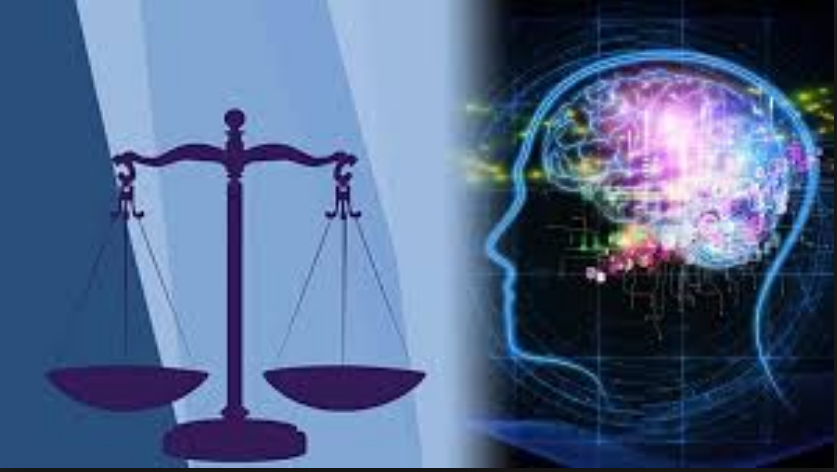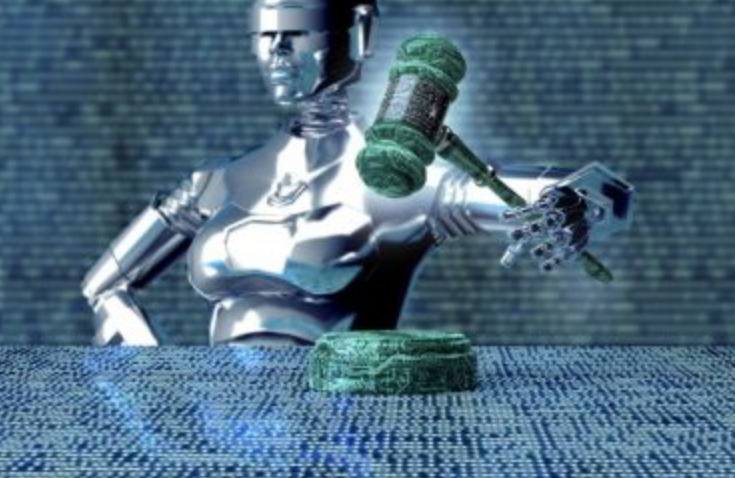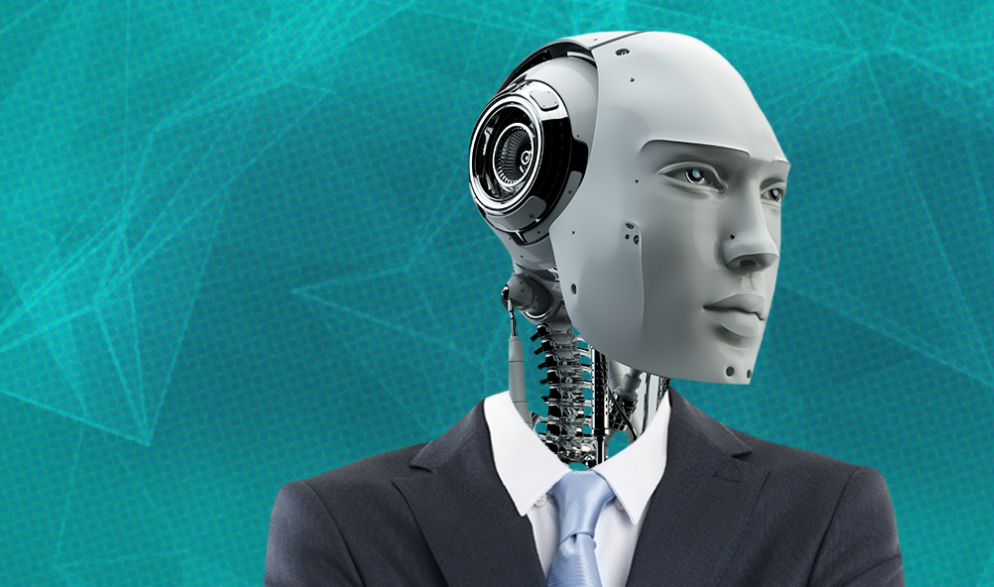aNewDomain — Robot lawyers? Don’t hold your breath.
Yes, artificial technology is rapidly improving — and true , AI will invade the legal business before you know it — but futuristic AI-infused robot lawyers aren’t going to replace legal pros anytime soon.
 AI-based tools and technologies created and customized for legal work are coming for sure, though.
AI-based tools and technologies created and customized for legal work are coming for sure, though.
That’s good news. AI-enabled software can use pattern recognition and extreme machine learning algorithms to help legal pros work faster. Their capability digest vast amounts of information and interpret it can help you work smarter, too.
The time to start thinking about the first wave of AI legal tools is now. You want to manage technology before it manages you. And that’s especially the case with AI, where the biggest winners will be those lawyers who can figure out how to harness machine intelligence to develop a more automated practice ahead of everyone else.
Here’s what to expect.
 Hyper-smart research tools
Hyper-smart research tools
How soon before AI arrives? In many respects, it’s already here.
ROSS is an AI-enabled legal research platform based around IBM’s futuristic Watson technology. Just ask it a legal question, in plain English, and rather than spiting out a pile of case law and statutes for you to dig through, it answers your question precisely and in detail.
Ross Intelligence co-founder Andrew Arruda says he is out to blend its AI technology into “the legal team of every lawyer in the world.”
Earlier this year, it signed up its first client, Baker Hostetler. The firm will be utilizing the tech for its bankruptcy cases. And several other huge firms have jumped on that bandwagon, too. According to a test Dentons ran using ROSS early this year, such systems can also be utilized as a way of offloading some of the most simple, boring tasks associates deal with.
 That means you can assign those associates more meaningful tasks that can amplify or even accelerate the important work you do.
That means you can assign those associates more meaningful tasks that can amplify or even accelerate the important work you do.
And then there’s Beagle.
The eponymous Microsoft-based AI startup behind it is working on the same idea, but specific to contract review. Not only does the firm claim Beagle can “read your contract in seconds” and rapidly pull out all the key things you need to know about it, but execs say Beagle also can learn — over time, it figures out the sorts of things you usually look for and begins building off that information.
Beagle’s makers say small and media firms can dramatically slash the estimated $30K they spend every year dealing with contracts.
Of course, systems like ROSS or Beagle aren’t lawyer replacements, they’re just tools — tools capable of saving attorneys who use them significant time, money, hassle or all three.
 Due diligence and contract review
Due diligence and contract review
AI tools that can help attorneys with due diligence are already on the market. Last week, London-based RAVN Systems launched Extract Direct, a version of RAVN’s existing AI product, Extract.
It is used by law firms for due diligence, contract analysis, review of financial documents, review of commercial real estate documents, and more, claims the law firm Reed Smith, which has been test flying the technology, along with Extract and a third RAVN product called ACE.
Extract Direct lets legal pros teach it how to read the documents and definite what key points there are of interest. The system can be configured by the client to handle a range of document sets and clients choose the KPIs they need, that may vary depending on the project.
The law firm uses RAVN’s AI technology to improve efficiencies and consistency of review for due diligence matters within its real estate group, according to this recent press release. The technology includes both Extract and another RAVN product, ACE, its applied cognitive engine.
Expect to see many more entries designed to help lawyers meet the tight deadlines in contract review and due diligence over the next few months.
Electronic discovery
Recommind, Equivio (Microsoft), Content Analyst are just three of a growing list of vendors who are developing or licensing so-called technology-assisted review (TAR) tools for attorneys. Such a tool can be a powerful ally for e-discover which, despite digitization, remains one of the most arduous and time-consuming tasks lawyers face.
Using TAR tools for e-discovery is harder than you might thing, though. You need to understand statistical mathematics, for one thing, especially if you’re going to be arguing your TAR findings in court. You’ll also need to be able to show that such findings meet the standards set out by Federal Rule of Civil Procedure 26 and similar rules.
Also, remember that TAR stands for assisted review, meaning it needs to be set up and trained by lawyers who thoroughly understand the case in question. They’ll also need the stats-smarts required to use it in an intelligent way.
Nonetheless, TAR is one of the big success stories in AI so far for a reason: It can be intensely powerful when in the right hands.
For a review of TAR tools and a guide to what to look for in this category, check out this paper from the University of Waterloo’s Gordon V. Cormack and Maura S. Grossman, from Wachtell, Lipton, Rosen & Katz. Another good resource is John Tredennick’s book TAR for Smart People.
Analytics
Another hot field for AI and the law lies around analytics: Using advanced algorithms, a lawyer can condense and identify trends hidding inside huge amounts of information.
“Nearly 80 percent of a company’s data is unstructured,” Jay Leib, cofounder of NexLP, told ABA Journal earlier this year, “While unstructured data represents the lion’s share of a company’s data, for years lawyers have been stuck with antiquated tools that focus primarily or solely on Boolean search. Better tools are needed to truly understand data, infer meaning, classify the various types of ideas present, and help you get to the result fast—even if that result didn’t involve the keywords you used.”
Understanding how stock market prices might link to securities fraud is one obvious use of analytics, he said.
“For example, when investigating securities fraud, price movement can be a very useful indicator,” Leib said.
“However, stock prices rise and fall throughout the trading day. Our analytic engine can overlay communications between traders discussing that stock-on-top-of-price-movement data to compare the times they both occurred. Perhaps the traders in question also emailed client information to themselves. By comparing these various data points, a clear pattern can quickly emerge—one that might have previously gone unseen or would have been considered circumstantial. These patterns allow financial firms to better understand and identify this behavior to prevent it, and also tell easy-to-follow stories to regulators or judges.”
Predictive analytics is another way big data analysis will be utilized in the future.
In 2014, a Michigan State University law school prof headed up an effort to build an algorithm that could accurately predict Supreme Court decisions. The resulting tool predicted, with about 70 percent accuracy, 7,700 rulings from 1953 to 2013. Adding more AI smarts to such systems will bring that level of accuracy up substantially.
Virtual Assistants
And then there are the legal versions of virtual assistants like Microsoft Cortana or Apple Siri, primarily for the purpose of answering calls, bookkeeping, scheduling and other tasks that are easily automated.
One of the first of these is called Kim, from Riverview Law. Kim is the technology behind several, specialized legal-oriented virtual assistants it offers.
For aNewDomain, I’m Jim Kelly.
Cover image: Washington State Bar Association, All Rights Reserved. Inside images: TheCollegeFix.com, All Rights Reserved; SeriousWonder.com, All Rights Reserved; George Washington University School of Law, All Rights Reserved; Sky Gould, Tech Insider, All Rights Reserved; Shutterstock, All Rights Reserved
As I mentioned above, here’s a video well worth watching, from the folks behind IBM Watson. Check it out.












